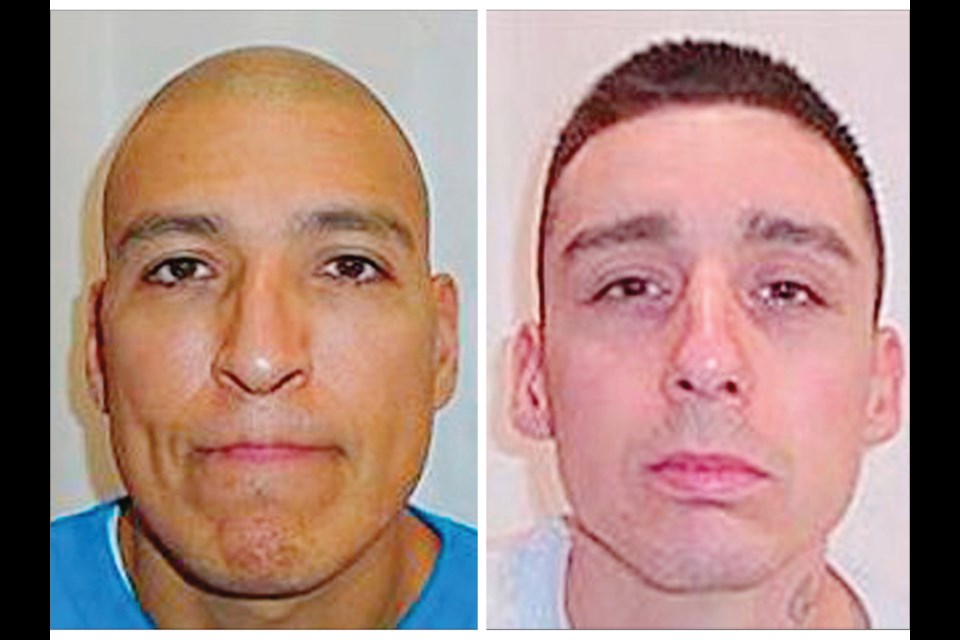A William Head prison escapee has been found guilty of first-degree murder in the brutal death of a Metchosin man three years ago.
A jury returned the verdict for James Lee Busch on Wednesday after deliberating for one day, unaware that Busch’s co-accused, Zachary Armitage, had already entered a guilty plea to first-degree murder two weeks ago.
Busch, 44, is to be sentenced Thursday, while Armitage, 33, is to be sentenced Tuesday morning at the Vancouver Law Courts. Payne’s family is expected to deliver victim impact statements at the hearings.
First-degree murder carries an automatic life sentence with no possibility of parole for 25 years.
Murder is considered first degree when it is planned and deliberate, or when it’s caused by someone committing or attempting to commit another offence, such as unlawful confinement.
Jury members heard that the two men walked away from the minimum-security penitentiary at low tide on the evening of July 7, 2019 and found their way overnight to Martin Payne’s home in rural Metchosin.
They holed up in Payne’s house after he left for work on the morning of July 8, 2019, and murdered him when he returned home.
The 60-year-old provincial government mail carrier and father of two was found dead on July 12 with a roll of duct tape still sticking to his thigh.
It’s not known how the murder unfolded, but the Crown believes the two escapees intended to use violence to get Payne’s PIN number for his bank card. They cut the heads off two axes to beat Payne with the handles and had a bowie knife and a hatchet nearby.
When Payne walked in the door just before 3:30 p.m., one man was waiting for him in the kitchen and struck him with an axe handle.
The second man came out of the master bedroom behind Payne and tried to wrap duct tape around his forearm and thigh. The two tried to confine Payne with the duct tape but he was too strong for them.
Payne tried to escape but the two stopped him at the front door. Payne was struck from behind with a hatchet and from the front with the bowie knife. The neck wound was fatal, the wound so deep it severed the arteries on both sides of his neck and injured his trachea and cervical spine.
Payne was also struck on the head several times with a hatchet, the blows fracturing his skull and penetrating his brain.
The defence had argued there was insufficient evidence to convict Busch of any involvement in the murder, noting his fingerprints were not found in the house. However, his DNA was found on clothing and shoes in garbage bags in the master bedroom.
When Busch walked away from William Head, he was serving a life sentence after being convicted of second-degree murder in 2010. He was transferred to William Head minimum security prison in November 2018, and would have been eligible for day parole in July 2022 and full parole in 2025.
Armitage was a serving a 14-year sentence for robbery and aggravated assault. He had been due for parole in September 2019. He had five previous escapes from prison. Both men pleaded guilty and received a one-year sentence for the escape.
The prison break created outrage in the community. After the escape, federal and municipal politicians questioned why the violent offenders were at the prison.
Payne’s daughters, Jessica and Calla, are suing the Correctional Service of Canada, claiming negligence allowed the two federal inmates to escape and murder their father.
The daughters filed their lawsuit in B.C. Supreme Court in August.
The lawsuit notes that Busch and Armitage had been transferred from Mission Institution, a medium-security prison in the Fraser Valley, to William Head as a result of an “override” assessment.
“The reclassification of the inmates to a low security level and their subsequent transfer to William Head were the result of operational decisions made by CSC and its employees that were negligent, reckless and contrary to CSC policy,” says the suit.
“Mr. Payne lived less than eight kilometres from William Head, which distance could be covered in approximately one and a half hours by foot. Accordingly, Mr. Payne was part of a discrete category of people who lived near to William Head and who might be harmed by inmates escaping that institution.”




